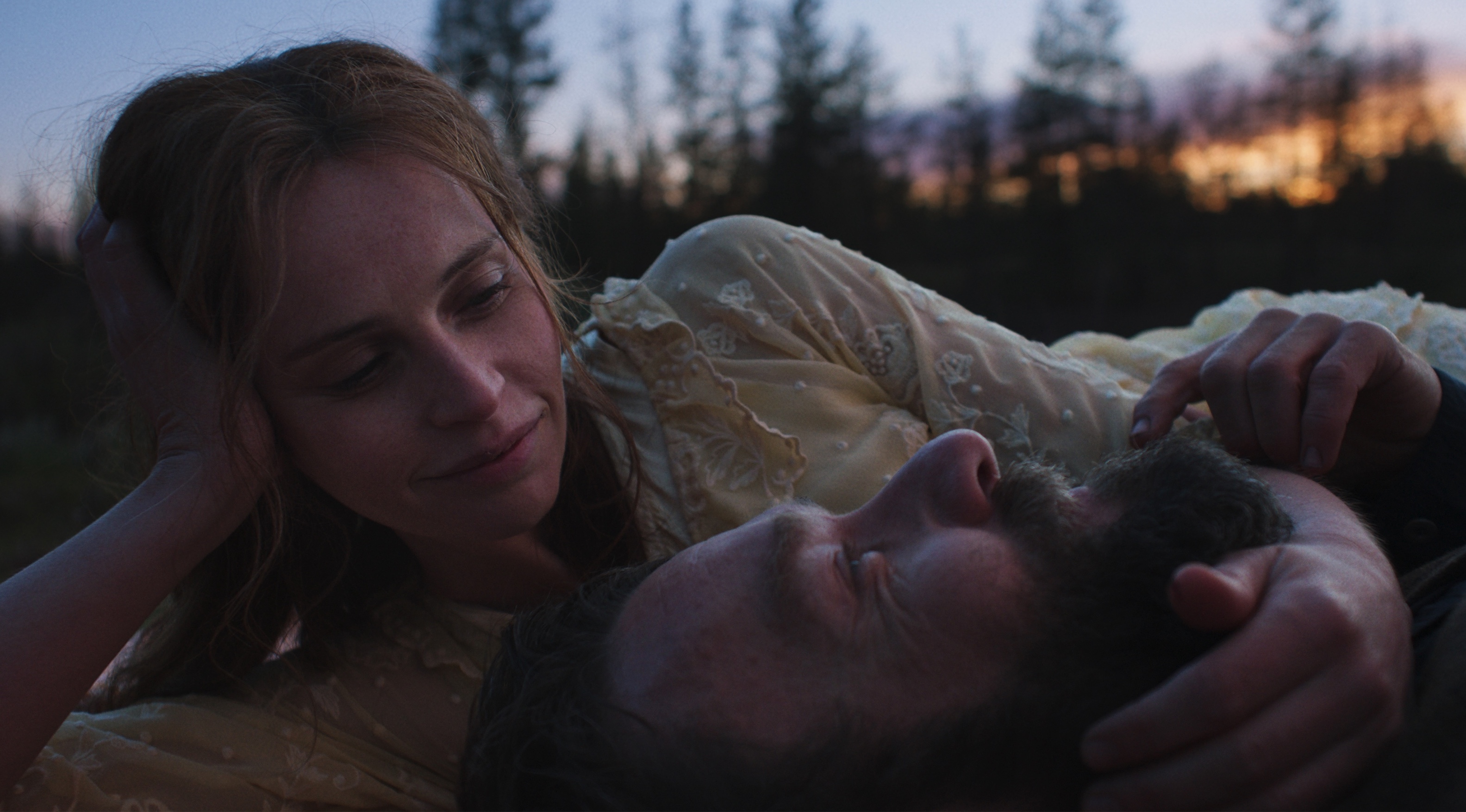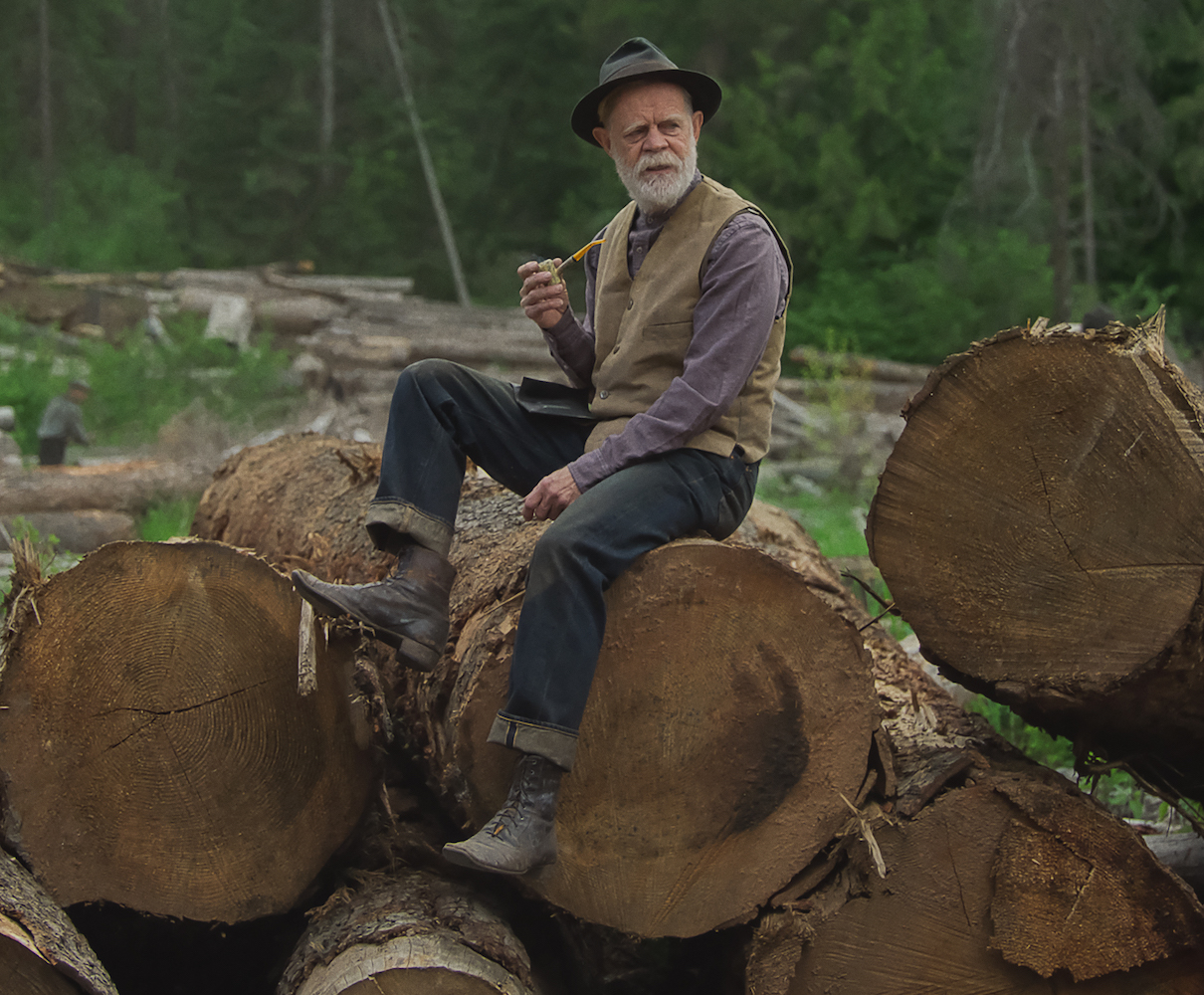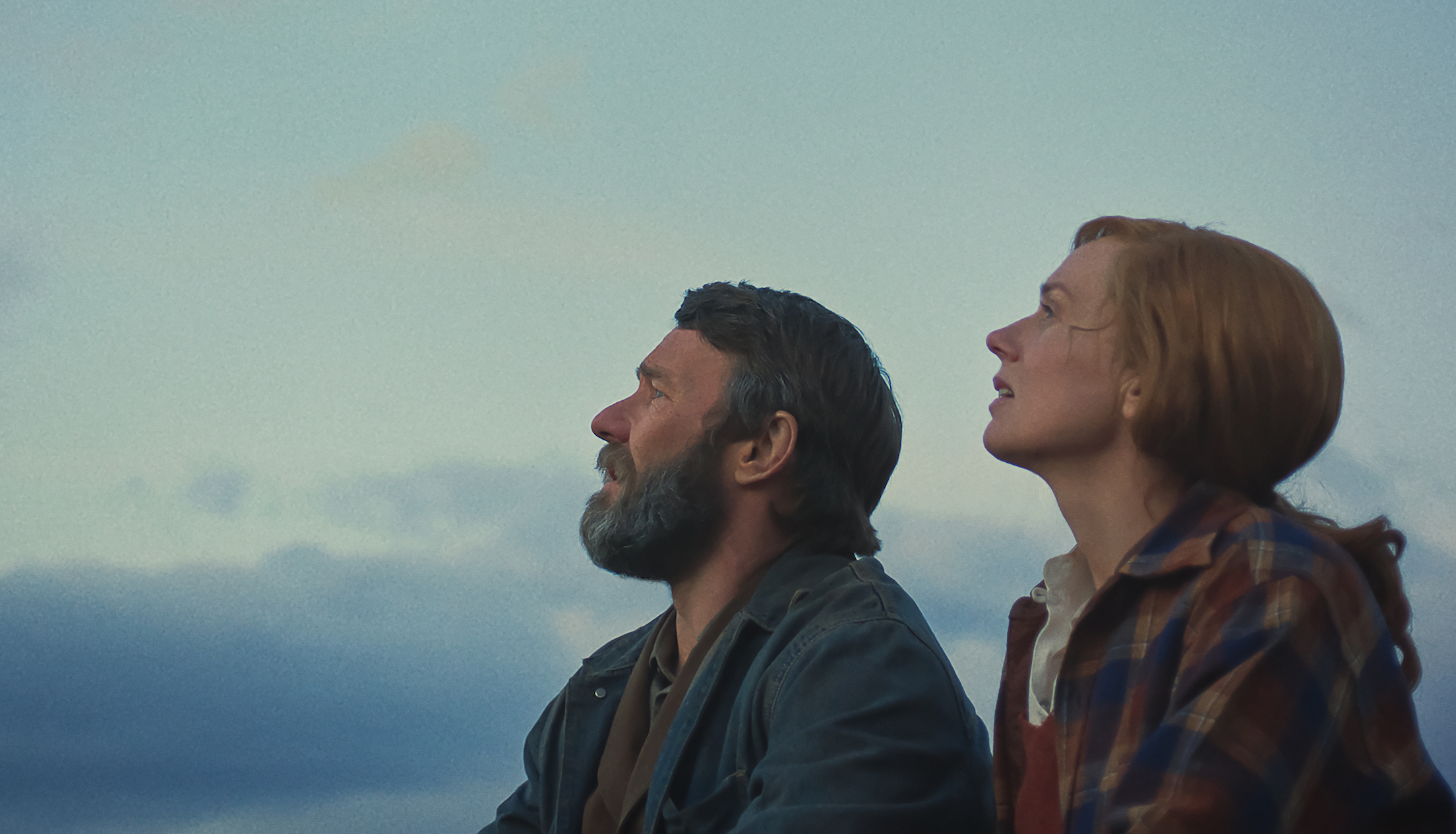What defines a life? Money and success? Happiness? Clint Bentley’s Train Dreams employs a narrator, much as Terrence Malick’s Days of Heaven did, who fields big questions like those while drawing the audience in. Bentley’s voice is an omniscient one, its owner unseen.
Like Malick, Bentley is scrutinising a small group of people living in a bygone era in a remote part of North America; Malick focused on the Texas panhandle, Bentley on small-town Idaho at the turn of the century. Here a logger called Robert Grainier (Joel Edgerton) ekes out a tough, often isolated living, moving with the work to logging camps throughout the the Pacific North West.  This hardscrabble life is more or less enough for him, a man of few words, until he falls in love and suddenly the world makes sense. His eventual bride is a beautiful woman (Felicity Jones, pictured right with Edgerton) who sings in the local church choir. They marry, stake out a plot of land and build a sturdy log cabin on it, lit with oil lamps and graced with an upright piano. In due course, they produce a pretty little girl, Katie, and Grainier realises he had never before felt so happy. But the logging season calls, and he travels on trains to where demand is: by this time, it’s for timber for the burgeoning railroads that are starting to criss-cross the region, sending the loggers deeper and deeper into the forest for trees to cut down.
This hardscrabble life is more or less enough for him, a man of few words, until he falls in love and suddenly the world makes sense. His eventual bride is a beautiful woman (Felicity Jones, pictured right with Edgerton) who sings in the local church choir. They marry, stake out a plot of land and build a sturdy log cabin on it, lit with oil lamps and graced with an upright piano. In due course, they produce a pretty little girl, Katie, and Grainier realises he had never before felt so happy. But the logging season calls, and he travels on trains to where demand is: by this time, it’s for timber for the burgeoning railroads that are starting to criss-cross the region, sending the loggers deeper and deeper into the forest for trees to cut down.
Much more than a pocket drama with a picturesque setting, the film tracks the arrival of what has become known as the “American Century”, charting the way the loggers’ lives intersect with social change. The regulars in Grainier’s team include a couple of old timers, left with no other trade and watching as the long two-handled saws they use in pairs are gradually superseded by a buzzsaw, speeding up their job but winnowing out the workforce. They are there until they drop – or a wayward felled tree drops on them. The younger loggers believe there will always be trees for them to cut down; the older ones rue every ancient specimen they remove, seeing it as yet another thread pulled in the web of the world. Wars come and go, including the one against Japan that leads to all the labourers of SE Asian origin being rounded up and incarcerated in camps, or worse, an event that haunts Grainier’s nightmares.
 In this remote world, signs of life are seized upon: boots nailed to a tree, marking the site where their owners are buried; a large bear slouching along a path near Grainier’s home; a comet passing overhead. Grainier’s dreams are increasingly troubled, and his sense of foreboding proves on the money when, approaching his home district after one stint away, suddenly the billowing clouds of a forest fire can be seen. Nothing in his life will remain the same from this point onwards. But as he slowly inches towards the grave, he starts to ask himself the questions he has possibly not stayed still long enough to focus on. Now they crowd out all other concerns.
In this remote world, signs of life are seized upon: boots nailed to a tree, marking the site where their owners are buried; a large bear slouching along a path near Grainier’s home; a comet passing overhead. Grainier’s dreams are increasingly troubled, and his sense of foreboding proves on the money when, approaching his home district after one stint away, suddenly the billowing clouds of a forest fire can be seen. Nothing in his life will remain the same from this point onwards. But as he slowly inches towards the grave, he starts to ask himself the questions he has possibly not stayed still long enough to focus on. Now they crowd out all other concerns.
It’s a short and simple story, based on a fine 2011 novella by Denis Johnson, but it contains multitudes, all projected with an unforced authenticity and naturalness. Music of a serialist flavour ripples in and out, never intrusively. You are left to watch the incremental signs of Edgerton’s ageing, the passing of his trade into the steam age. He is adept at conveying unstated emotions, his craggy bearded face registering a slight shadow here, a flicker of anger there. It’s his dreams that are vibrant and hallucinatory, a total contrast to the silence of the imposing landscapes he visits.
Along the way Grainier encounters immaculately realised people – the native American (Clifford Collins Jnr) who runs the general store in town and hunts and traps as a sideline; the old whiskery logger Arn Peebles (William H Macy, pictured above), a camp follower now, unsuited to the hard graft of cutting and transporting the logs, his genial philosophising a model for withstanding hardship. In particular, there’s the enterprising Montana woman, Claire (Kerry Condon, pictured below with Edgerton), to whom Grainier gives a ride in older age, when he turns his hand to ferrying goods and people in a wagon, A widowed former army nurse, she is delighted to have found a job as a researcher at an observation post in the forest, where she will live alone quite happily. Unlike Grainer, who is always looking up at treetops, Claire's vision of her new home reaches far back into the Ice Age, and down to its orginal state, when a glacier covered it. She seems to spur Grainier into exploring new territory too. His solace comes from finally moving up into the sky, like a godlike observer, piloted by a woman offering private excursions. Finally he has a literally uplifting view of the world that isn't crowded out by giant trees. Through the prism of this introverted man, the film becomes an elegy for a lost way of life, as the cycle of change grinds on.
Unlike Grainer, who is always looking up at treetops, Claire's vision of her new home reaches far back into the Ice Age, and down to its orginal state, when a glacier covered it. She seems to spur Grainier into exploring new territory too. His solace comes from finally moving up into the sky, like a godlike observer, piloted by a woman offering private excursions. Finally he has a literally uplifting view of the world that isn't crowded out by giant trees. Through the prism of this introverted man, the film becomes an elegy for a lost way of life, as the cycle of change grinds on.
- Train Dreams is in cinemas from November 7; on Netflix from November 25
- More film reviews on theartsdesk















Add comment